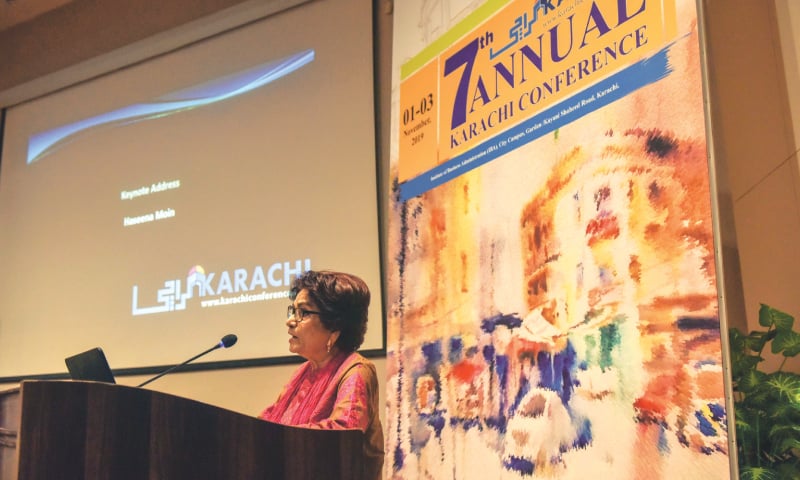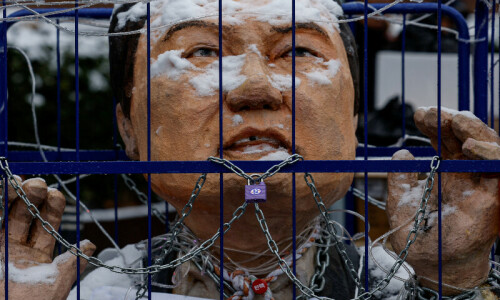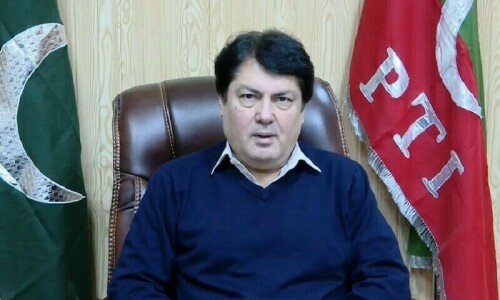KARACHI: A nostalgia-filled keynote speech by writer Haseena Moin nicely set the tone for the second day of the 7th Karachi Conference at the Institute of Business Administration on Saturday.
The writer went down memory lane reminiscing about the people who lived around her. Today, she bemoaned, (aik sawal mujhe saakit ker deta hai) a question stuns her: “Who are we?” When she was a child, she said, she used to say that she’s a Pakistani. The answer nowadays is the same but those who receive this response find it hard to believe. “Why do we need to assure people about it?” People ask: “Where do you come from? Are you an Urdu speaker?” She said she did not like to respond by saying she’s an Urdu speaker.
Ms Moin narrated to the audience that when her family migrated to Pakistan, it was with love that she and her siblings set foot on this land. Her father was transferred to Pindi, and before that one of his friends made them stay in Karachi for a couple of days where they got to see trams, camels and donkey-driven carts, and also got to hear a flutist play the flute beautifully. Two years later her father was asked to serve in Karachi, where they initially lived at a hotel because he didn’t like the idea of the pagri system. Here too they got to hear the flutist. Three months later her maternal uncle got them a flat on rent. Despite being a smaller unit, it accommodated not just members of the family but guests coming from across the border. After that, the family shifted to Lahore and then again to Karachi.
Writer says questions about her identity other than being a Pakistani disturb her
Back in the Sindh capital, Ms Moin said she joined Government College for Women, Frere Road, took part in a drama-writing competition for radio and then became a known figure.
She returned to the topic she had started her speech by reiterating that when she was young, no one used to ask her who she was, but now it had become difficult to find the answer to the question. She articulated that “our salvation lies in trying to find that answer”.
Dr Kaleemullah Lashari was the first formal speaker of the opening session chaired by architect Arif Hasan to present his research work. His presentation was on the future of Karachi’s heritage.
He started off by arguing that it had taken time to sensitise [people] to the importance of heritage. He said such issues were linked to relevant laws. Those who had held the reins of Karachi mostly focused on matters that they liked to focus on (haakimon ne apney pasand ke maamlaat per tawajjah di).
Dr Lashari traced the history of the subject by first mentioning the presence of Chawkandi tombs, then spoke at length about the British who made agreements in Sindh on different occasions. “The annexation of [Sindh] was indicative of attitude [of the British].” In 1904, Lord Curzon made a law about heritage. But even in those times heritage laws were used “miserly”. After independence Karachi became the capital of Pakistan which burdened it with a lot of other needs. And even when the capital was taken to Islamabad heritage buildings did not return to their “original use”.
This led Dr Lashari to underline the different laws related to heritage that were made over the years and emphasised that while laws were there, there’s no regulation or rule which had created a big gap.
The post-lunch session on the future of Karachi’s development, chaired by Mansoor Raza, had Dr Sarosh Lodhi listed as the first speaker but he couldn’t make it to the moot.
Politician Dr Farooq Sattar replaced him. Dr Sattar with reference to the rains that recently affected the city said there were other cities in the world that received more rains than Karachi did, but they were prepared for such situations. He said he wouldn’t like to blame anyone for it, but there was criminal negligence on the part of the federal, provincial and city governments. Karachi needed a pluralistic vision, and “we can’t continue to do experiments with democracy”. He was of the view that Article 140(A) was the solution to Karachi’s problems.
Earlier, Dr Asma Ibrahim, president of the Karachi Conference Foundation, in her welcome address talked about the time when the moot first took place and compared it to its seventh edition. She said: “Today the winds of change are in our favour.” The goal of the conference, she added, was to bring together diverse research [on the city], and its aim was to celebrate the socio-cultural mosaic that it was.
Published in Dawn, November 3rd, 2019














































